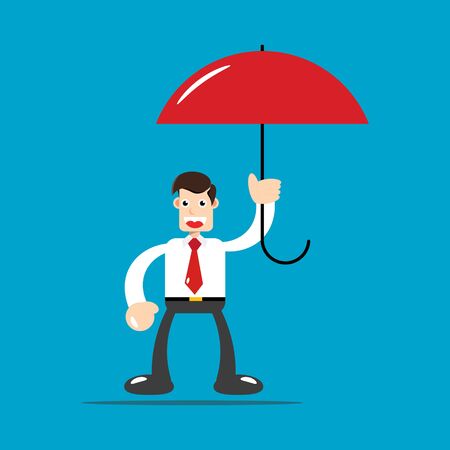Understanding the Self-Employed Income Challenge
For many self-employed individuals in the UK, from family-run businesses on the high street to independent freelancers working from home, a steady income is never taken for granted. Unlike salaried employees who may benefit from sick pay or company health schemes, the self-employed are uniquely vulnerable when illness or injury strikes. Imagine a local bakery owned by a husband-and-wife team; if one partner falls ill, not only does their daily routine come to a halt, but so does a significant portion of their household income. Similarly, consider a freelance graphic designer who relies solely on client projects—if an accident leaves them unable to work for several weeks, invoices stop and bills begin piling up. These real-life scenarios highlight how quickly financial stability can unravel without the safety net of regular employment benefits. The unpredictability of health issues makes it essential for self-employed professionals to recognise just how fragile their income stream can be, and why proactive planning is crucial to safeguard both business and family wellbeing.
2. Real-Life Stories: Personal Impact of Illness and Injury
When considering the true impact of illness and injury on self-employed individuals, it is crucial to look at real-life scenarios that many families in the UK face. These stories not only reflect the emotional strain but also highlight the financial consequences that follow unexpected health setbacks.
Take, for instance, Tom, a freelance web designer from Manchester. Last winter, Tom suffered a serious cycling accident that left him unable to work for several months. As the sole provider for his young family, he found himself grappling with mounting household bills while still recovering from surgery. With no employer sick pay scheme, his savings dwindled quickly and the stress affected both his recovery and family life.
Similarly, consider Priya, a self-employed childminder from Bristol, who was diagnosed with breast cancer. Balancing her treatment schedule with looking after her two children became overwhelming. Without any income protection insurance in place, Priya’s family had to rely on government benefits, which covered only a fraction of their regular expenses. This sudden drop in income forced them to make difficult choices about daily necessities and long-term plans.
The Emotional and Financial Toll
Scenario |
Emotional Impact |
Financial Impact |
|---|---|---|
Toms Accident |
Stress of being unable to provide; anxiety about future security; feeling of helplessness during recovery | No regular income; rapid depletion of savings; delayed payments for utilities and mortgage |
Priyas Illness |
Fear for health; worry over children’s wellbeing; guilt over reduced quality of life for family | Loss of steady earnings; reliance on limited state support; postponement of family plans (e.g., home improvements) |
These examples clearly show that beyond the initial shock of illness or injury, self-employed individuals can face prolonged periods of uncertainty. The lack of a safety net not only disrupts business operations but also places emotional pressure on families as they try to maintain stability. Planning ahead with appropriate insurance can help mitigate these risks and provide peace of mind when unforeseen circumstances arise.

3. UK Safety Net: What’s Available – and What’s Missing
For self-employed individuals in the UK, the financial safety net provided by the government is notably different from that available to employees. One of the most significant limitations is the lack of access to Statutory Sick Pay (SSP). While employees can rely on SSP from their employers if illness or injury prevents them from working, self-employed workers are not eligible for this benefit at all. This means that any period off work due to health issues can directly impact income without any guaranteed support.
To fill this gap, the UK offers certain benefits such as Universal Credit and Employment and Support Allowance (ESA). Universal Credit is a means-tested benefit designed to support people on a low income or out of work, but it often does not reflect the reality of fluctuating earnings experienced by many self-employed people. The application process can be lengthy and complex, with monthly assessments that may not align with actual business cash flow. ESA, on the other hand, is intended for those who are unable to work due to illness or disability; however, eligibility is tightly restricted and the amount paid may not be sufficient to cover ongoing expenses.
Another challenge unique to the UK system is the so-called Minimum Income Floor, which assumes a certain level of monthly income when calculating Universal Credit for self-employed claimants. If your earnings dip below this threshold because of illness or injury, you may receive less support than you actually need. Combined with delays in payments and strict eligibility criteria, these factors often leave self-employed individuals exposed to greater financial risk compared to salaried employees.
In summary, while there are some government safety nets available in the UK, significant gaps remain for self-employed workers facing ill health or injury. Understanding these limitations is crucial for planning ahead and considering private insurance options to protect your family’s financial well-being.
4. How Insurance Can Make a Difference
For self-employed individuals in the UK, facing an unexpected illness or injury can quickly turn into a financial crisis. Unlike employees with sick pay, you might find your income stops immediately if youre unable to work. This is where income protection and critical illness cover step in, offering a crucial safety net for your household. Let’s look at how these insurance products can ease everyday burdens and help maintain stability for your family.
The Value of Income Protection
Income protection insurance pays out a monthly benefit if you are unable to work due to illness or injury. This regular income can be used to cover essential household expenses, so the mortgage, bills, and food shopping don’t become sources of anxiety during recovery. For example, if you’re a freelance graphic designer who breaks a wrist and cannot work for three months, income protection can provide up to 70% of your typical earnings during this time.
Critical Illness Cover Explained
Critical illness cover offers a lump sum payout if you’re diagnosed with a serious health condition like cancer, heart attack, or stroke. This money can go towards immediate medical costs, adapting your home, or even paying off outstanding debts. Picture this: you run a small consultancy from home, and after being diagnosed with a critical illness, you use the insurance payout to clear your mortgage and cover private treatment expenses, easing both financial and emotional stress for your family.
How Insurance Supports Family Life: Practical Examples
| Scenario | Without Insurance | With Insurance |
|---|---|---|
| Sole earner develops long-term illness | Struggles to pay bills; may need to rely on savings or borrow money | Receives monthly income replacement; household bills are covered |
| Parent suffers critical illness | Difficulties covering childcare and mortgage payments; added stress during recovery | Lump sum helps pay for childcare support and clears outstanding debts |
| Freelancer injured at work | No income while recovering; possible threat of losing home | Ongoing payments ensure mortgage is paid and essentials are managed |
Making it Work for Your Family
Ultimately, having the right insurance means you and your loved ones won’t have to make tough choices between daily necessities and long-term security when life takes an unexpected turn. Whether it’s keeping up with mortgage payments or ensuring that children’s routines remain undisturbed during difficult times, income protection and critical illness cover give peace of mind that financial stability is within reach—even when health issues arise.
5. Planning Ahead: Tips for Self-Employed Families
If you’re self-employed, planning for illness or injury isn’t just wise—it’s essential. Without the safety net of employer-provided sick pay, a sudden health setback can quickly disrupt your family’s finances. Here are practical steps to help you assess your risks, weigh insurance options, and put a solid plan in place.
Assess Your Financial Vulnerability
Start by examining your household’s monthly expenses and income streams. Ask yourself: how long could your family maintain its current lifestyle if you were unable to work? Consider fixed costs like mortgage or rent, utilities, food, and childcare. This honest assessment will highlight potential gaps should your earnings stop unexpectedly.
Compare Relevant Insurance Policies
The UK market offers several types of insurance for self-employed individuals. Income Protection Insurance pays out a percentage of your usual income if illness or injury prevents you from working. Critical Illness Cover provides a lump sum if you’re diagnosed with a serious condition. Private Medical Insurance may help you access treatment faster, supporting a quicker return to work. When comparing policies, consider factors such as waiting periods before payouts begin, policy exclusions, and whether benefits are paid tax-free.
Shop Around and Read the Small Print
Use comparison websites or consult an independent financial adviser to explore the best deals. Don’t just look at premiums—check what’s actually covered, any limitations on claims, and how long payments would last. Remember that the cheapest option isn’t always the best fit for your family’s needs.
Create an Emergency Fund
Even with good insurance in place, having savings to fall back on is invaluable. Aim to build up at least three to six months’ worth of living expenses in an easily accessible account. This buffer can help cover immediate costs while insurance claims are processed or during policy waiting periods.
Review Your Plan Regularly
Your circumstances will change—children may arrive, mortgages may increase, or your business might grow. Make it a habit to review your insurance cover and emergency fund every year or after any major life event. Proactive planning ensures that you and your loved ones are protected no matter what life throws your way.
6. Common Pitfalls and How to Avoid Them
For many self-employed individuals, safeguarding income against illness or injury is often put on the back burner, especially when business is thriving. However, overlooking income protection can leave your family financially vulnerable if the unexpected occurs. One common pitfall is underestimating how long it could take to recover from an illness or accident, leading to insufficient cover that doesn’t meet ongoing household expenses.
Another frequent mistake is assuming that state benefits will fill the financial gap. In reality, statutory sick pay isn’t available for the self-employed in the UK, and Universal Credit may not be enough to cover mortgage payments, utility bills, or children’s needs. Some people also take out policies without fully understanding what’s covered—missing exclusions related to pre-existing conditions or opting for cheaper policies with limited benefits.
Failing to review insurance policies regularly as family circumstances change is another trap. Major life events—such as getting married, having children, or moving house—can all impact your income protection needs. What suited you a few years ago may now fall short if your outgoings have increased or you’ve taken on new responsibilities.
To avoid these pitfalls, it’s vital to seek professional advice and tailor your policy to reflect your actual needs and lifestyle. Take time each year to review your insurance documents and make adjustments when there are significant changes in your personal or financial situation. Remember: what works for a single freelancer might not be suitable for someone supporting a family of four in the Midlands.
Ultimately, being proactive about income protection ensures peace of mind—not just for you, but for those who rely on you most. By avoiding these common mistakes and keeping your cover up-to-date, you can focus on running your business and caring for your loved ones, no matter what life throws your way.


